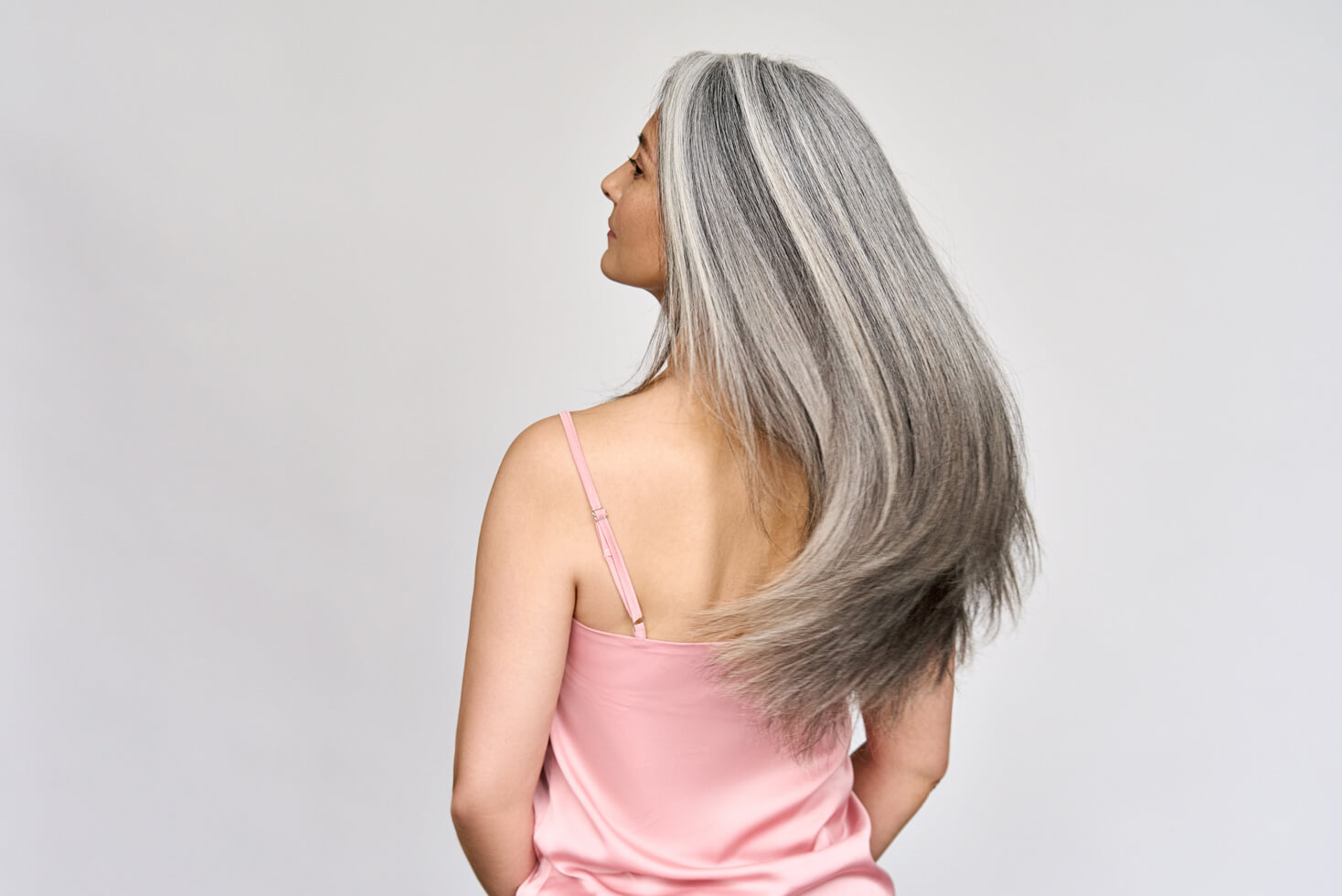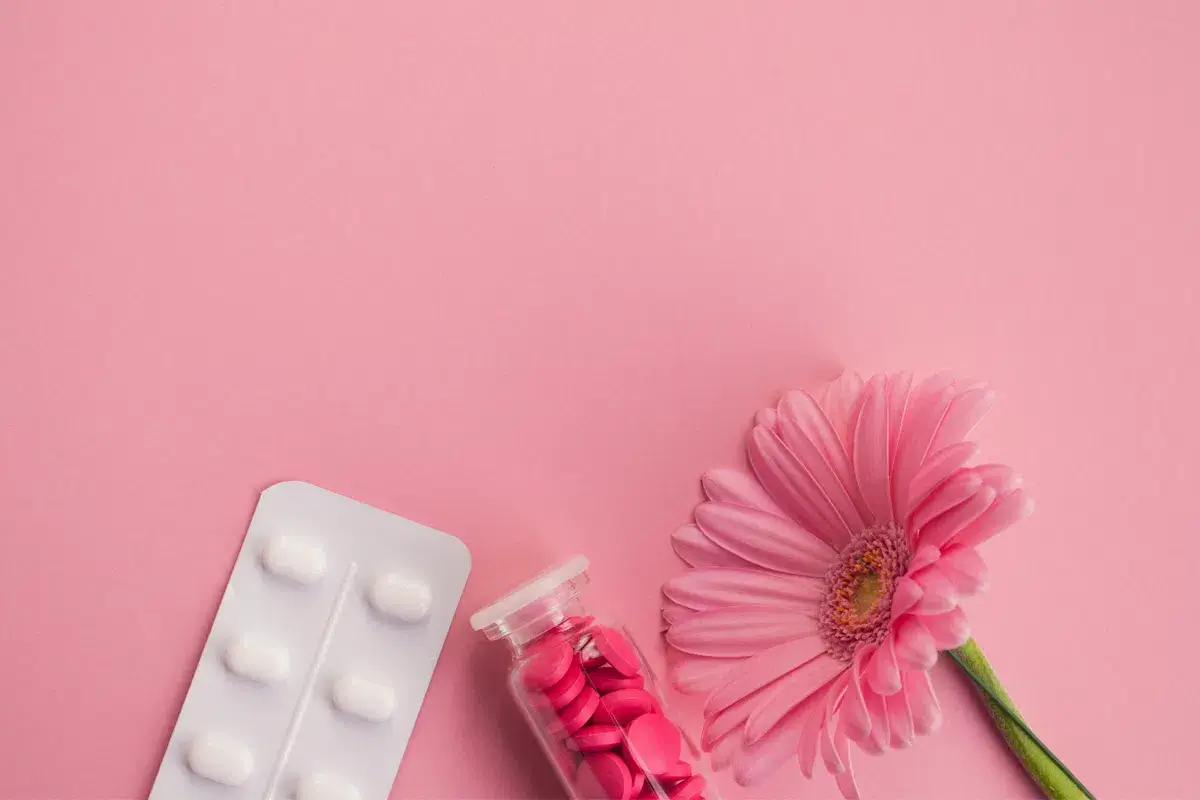How to Embrace and Tame Frizzy Hair During Menopause
Updated on
This post may contain affiliate links. As an Amazon Associate, we may earn from qualifying purchases.

As if mood swings and hot flashes weren’t enough, turns out frizzy hair during menopause is another common problem many women also struggle with but don’t know how to manage or embrace it.
While there’s nothing inherently wrong with changing hair textures during a time when your estrogen levels are on the decline, we women will always yearn for smooth, glossy, and frizz-free hair that makes us feel younger and more feminine.
After all, our hair is such an important part of our self-identity. Even when we are on the verge of a middle-age meltdown… Beautiful hair matters!
So let’s talk about Menopause and Frizzy Hair.
Whether you’re in the full swing of it or coming out the other side, let me show you how you can overcome the mystical powers of your hormones and bring your locks back to their full potential.
Why Does Hair Become Frizzy During Menopause?

Hair becomes frizzy during menopause because of hormonal changes that affect the hair growth cycle, density, texture, and scalp oil production – all of which contribute to frizz-prone hair.
The changes in hair texture, the lack of a natural moisture balance, and inconsistencies in growth cycles can all contribute to the manifestation of frizzy hair. Frizzy hair is characterized by hair strands that deviate from the hair’s natural pattern, either standing out or curling away unpredictably.
Let’s delve deeper into how hormonal changes during menopause affect hair, and how each of these changes renders hair more prone to frizz.
1. Estrogen Deficiency

Estrogen and Progesterone are two female hormones that regulate cellular growth activities in the hair cycle. In other words, they keep your hair growing for longer (in the Anagen phase).
When estrogen levels are high, the hair cells divide and distribute rapidly at the base, making them incredibly productive at regenerating stronger hair fibers from within. That’s why in our younger days, our hair has the ability to heal faster after bleaching, coloring, and excessive heat styling.
But as you approach and go through menopause, these two hormones slow down significantly, causing an imbalance with Androgen – a male hormone, which is also produced in small amounts by the female body.
Androgens slow down the hair growth phase causing the hair’s follicular activities to decline rapidly.
As a result, less hair growth, thinning hair strands, and a noticeable deficit in hair density ultimately contribute to the appearance of frizzy and withered hair.
2. The Scalp Produces Less Sebum

According to a study on 50 postmenopausal women, a Sebumeter used to measure the casual sebum level, and excretion rate showed a significant decline in sebum production, followed by an increase in sebum replacement time.
A lack of total sebum coverage causes the hair and the scalp to dry out faster in between washes. And when your hair is deprived of its natural oils, frizz is inevitable.
3. Natural Decline In Collagen

Collagen is one of the body’s most critical proteins, supporting and enhancing skin, hair, and blood vessels.
It’s one of the main building blocks of the hair, which holds the structure firm together, allowing it to flex without snapping like dry spaghetti when you manipulate your hair.
It’s a crucial fibrous protein that the hair needs to power its cellular machinery.
Without collagen, the hair fibers cannot maintain their optimum growth cycles.
During menopause and postpartum the body produces less collagen, which explains why the skin’s elasticity drops and the hair loses its spring and stretch factor resulting in limp and weaker hairs.
Lack of collagen can contribute to more frizz due to weakening hair texture, loss of strength, and the hair’s inability to retain moisture.
4. Hormonal Medications

Menopause, which is undoubtedly a tumultuous time for women, can lead to stress, anxiety, and many other health conditions that may require medications for emotional support and physical wellbeing.
However, some medicines like antidepressants and painkillers may contain beta-blockers that may affect hair texture and growth, leading to wiry hair, thinning hair, and frizziness.
5. The Double Whammy of Aging and Hormonal Shift

Many studies have shown that hair ages just like the skin and every other part of the body. As you get older, your hair loses pigmentation, density, and the follicles shrink, reducing the hair diameter and length altogether.
All these combined causes the hair strands to develop less resistance to moisture, weather conditions, and sensitivity to chemical products making it challenging to manage and almost impossible to shield away from frizz-inducing conditions.
Can Menopause Change Your Hair Texture?
Yes. Menopause can cause changes to the hair texture.
Follicle sensitivity and slow growth cycles during this maturing phase cause the follicles to produce thinner hairs at a slower rate. This impacts how the hair looks and feels and also the overall coverage of the scalp.
How to Control Frizzy Hair During Menopause
The best way to control frizz during menopause is to keep the hair low maintenance and moisturized at all times.
Follow these tips below:
Use a Moisture-Rich Conditioner
Use a moisture-rich conditioner and be very generous, especially when your hair feels dry and unbalanced during menopause.
On non-washdays, leave-in conditioners are excellent for taming frizz and keeping your tresses smooth and hydrated throughout the day without minimal fuss. A leave-in like the John Frieda instantly nourishes the hair without leaving it feeling heavy or greasy. Plus, you can layer it with any other styling products, and it just works.
ThickTails Growth Conditioner for Menopausal Hair
Weather-Proof Your Hair
Don’t let your hair be at the mercy of frizz-inducing weather conditions like humidity, rain, cold air, and scorching sunshine.
Keep an eye on the weather and frizz forecast before you head out. Plan the right hairstyle and carry appropriate hair accessories like a hat or umbrella to avoid getting caught out in a frizz emergency.
Use a anti-frizz hairspray to set, lock, and seal your hair for maximum protection.
Adopt Low-Maintenance Hairstyles
Fancy hairstyles require more attention and a few products to set and lock in place throughout the day.
But when your hair doesn’t feel right, why force it?
Adopt low maintenance hairstyles like buns and ponytails that don’t require a lot of time to put together. These hairstyles will also hide unruly and frizzy hair throughout the day.
Carry an Anti Frizz Product In Your Handbag
There are many products that can help you fix frizz instantly on the go.
Anti-frizz hair sheets, for example are totally discreet. You can easily use them to swipe frizz away when your hair takes a bad turn. Or you can use an anti-frizz spray to lock in your hairstyle and lock out humidity.
Recommended: Best anti-frizz hair sheets.Best Ways to Avoid Frizzy Hair During Menopause
My simple advice: Don’t stress about it.
Hair losing its texture, smoothness, volume, is all part of the natural aging process. Keep supporting your hair with the right care and lifestyle changes so that you can minimize the aging effects.
Here’s what you can do to make your hair feel and look better:
Reduce Your Stress Levels
Stress has a direct impact on how your skin and hair feel.
So don’t overthink it, and engage in mindful practices like yoga and meditation to support your body’s changing biology. It’s important to remember that you’re not alone on this journey.
Link up and talk to other people who are going through a similar phase and seek out emotional support.
Change Your Shampoo
Use shampoos formulated to boost hair thickness, density, and texture to counteract the detrimental effects of hormonal imbalances that affect the hair.
Look for specific ingredients like biotin, caffeine, saw palmetto, and minoxidil. They stimulate blood flow to the scalp, help thicken the hair shafts, and can help improve the overall texture of your hair.
Check Out: The best shampoos for menopausal hair.
Embrace Silk
Increased perspiration caused by hot flashes can cause your hair to frizz overnight.
Using a silk pillowcase can provide comfortable relief by wicking away excess moisture from your hair.
Silk is an excellent thermoregulator and its ultra-fine texture allows your hair to glide while you shuffle around in your sleep. No tangles, no mess, and no frizz when you wake up.
SLIP Silk Pillowcase
Switch to a Microfiber Towel
Microfiber towels are excellent for finer hair textures as they are gentle, smooth, and absorb moisture instantly without the need to rub.
Unlike cotton towels, the microfiber material doesn’t create friction to disrupt the cuticle layer when the hair is wet, which is one of the main causes of frizziness after washing the hair.
Aquis Microfiber Towel
Use Cuticle Sealing Products
Hair has the tendency to develop frizz when the cuticles are open and not aligned flat, thus allowing moisture to creep in.
You can prevent this from happening by using a cuticle sealing hair treatment, like a serum, to add an extra layer of protection or a moisture barrier over the hair shafts. While preventing frizz, a sealing product also works to block out UV and pollutants from making your gray hairs looks trashy.
GK Organic Argan Oil Anti Frizz Hair Serum
Use Less Heat
Protect your hair from the rigors of high heat by ditching the blow dryer and the hair straightener. Only use heat styling when necessary.
As your hair grows finer and the texture changes, it’s important to replace your styling tools with new ones that won’t cause further hair damage.
For example, invest in hair stylers that have smart heat technology.
The GHD Platinum styler and Dyson Supersonic hair dryer are excellent products that use Ionic heat, which gentle and non-damaging to the hair in the long run.
Stay Hydrated
You can never underestimate the role hydration plays in how your skin and hair look and feel.
If you’ve been slacking on consuming the minimum required of water per day, I challenge you to do it for 30 days and watch how it changes your skin complexion and hair.
Always keep yourself hydrated. It nourishes your skin and hair from within.
Speak to a Trichologist
If you’re still struggling despite making positive changes to your hair care routine, speak to a Trichologist to get the low down on exactly what may be affecting your hair. A professional examination and diagnosis can help reveal other underlying health conditions that may be affecting your hair health.
A Trichologist is a medical professional who can accurately diagnose your hair and scalp problems and support you in finding the right balanced diet, supplements, and hormonal replacement therapy (HRT) to boost your overall hair and scalp health.
Best Recommended Products for Frizzy Menopausal Hair
1. Nutrafol Women's Balance
Key ingredients:
- Collagen
- Saw Palmetto
- Maca
- Sensoril Ashwagandha
- Biotin
- Zinc
- Iodine
Powered by hormone-balancing botanical nutrients, Nutrafol works to stabilize your shifting hormones during menopause to bring balance to your hair at follicular level.
It’s an excellent product specifically engineered to combat Perimenopausal, Menopausal, and post menopausal hair problems for women.
According to a study, the Nutrafol Women’s Balance has proven to reduce hair loss and thinning in women by 32.41% in 180 days.
2. ThickTails Hair Growth Shampoo and Conditioner
The Thicktails shampoo and conditioner set is specifically engineered for women who experience Menopausal and Postpartum hair problems.
It’s formula is designed to suppress DHT blockers and reactivate your hair follicles with active ingredients like Saw Palmetto, Caffeine, Vitamins B5, and Biotin.
It effectively stimulates your scalp’s natural oils, collagen production, and reduces inflammation around the hair shaft to give your hair growth cycle a boost.
What’s even better is that it’s pH balanced, doesn’t contain parabens or sulfates, and the reviews are pretty darn good too!
This product promises to revive dull hair and unlock fuller, thicker, and healthier hair with less breakage for aging women.
Do Not Let Menopausal Frizzy Hair Define You!
We can never reclaim our 20-something skin and hair, but we can explore this unique and emotional experience to transition our life into another phase of self-acceptance.
Truth is, for us women, one-third of our lives is post-menopausal.
Therefore it’s a new normal we’ll have to live with whether our skin feels saggy, our waists thicken, or our hair turns gray and frizzy.
It’s how you bring your best self forward by transforming your frizzy menopausal hair into a NEW style that works for you and makes you feel comfortable throughout this journey.
Nutrafol Women's Balance
About the Author
 Shehnaz Shirazi
Shehnaz ShiraziShehnaz Shirazi has been writing in the beauty and cosmetics industry for over 8 years, sharing her expansive hair care and beauty knowledge. Shehnaz researches and tests new hair care trends and publishes her insights here.





